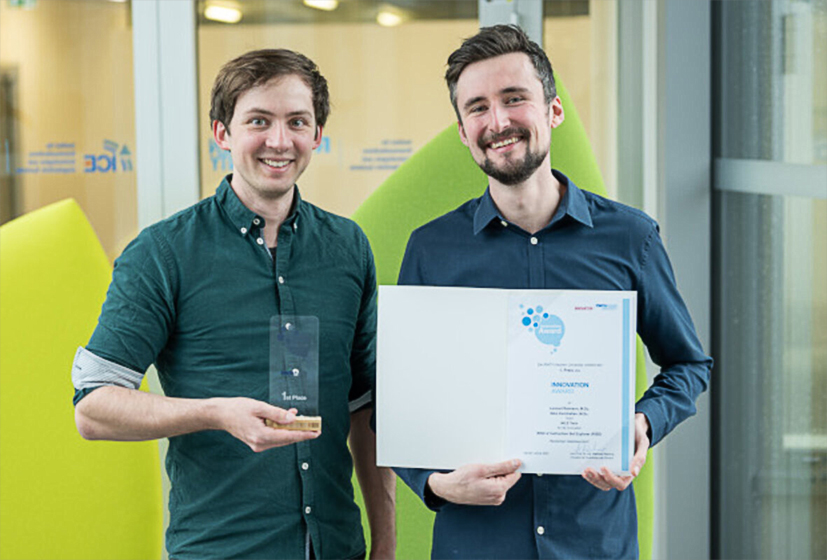Kategorie: ‘Auszeichnungen’
Friedrich Wilhelm Prizes 2024

Professor Ulrich Rüdiger, Rector of RWTH Aachen University, honoured 22 outstanding graduates with the Friedrich Wilhelm Prize 2024. ©Andreas Schmitter
Three individuals, distinguished for their academic excellence, were recognized as winners of the Friedrich Wilhelm Prizes for their exemplary final theses, which were developed under the auspices of the Faculty of Electrical Engineering and Information Technology.
Christian Fester, a research assistant at the Chair of Transmission Grids and Energy Economics at RWTH Aachen University, was awarded recognition for his master’s thesis, entitled ‘Validation and further development of a method for topology optimisation of the German transmission grid using real operational planning data’. The thesis provides innovative impulses for the integration of the optimisation of switching operations into the preview processes in the German transmission grid.
Following the completion of his Bachelor’s degree at RWTH Aachen University, Maximilian Henri Vincent Tillmann proceeded to undertake the T.I.M.E. Double Degree Programme, which enabled him to obtain a Master of Science in Electrical Engineering, Information Technology and Computer Engineering at RWTH Aachen University and Keio University. His thesis, which was awarded the Friedrich Wilhelm Prize, is entitled ‘Investigation on Autoencoder Models for Online System Identification’.
In recognition of his academic achievements, Dr Eduard Heidebrecht was also honoured for his dissertation, entitled ‘Alternative Concepts for Wideband Doherty Power Amplifiers’. His research is conducted at the Chair of High Frequency Electronics at RWTH Aachen University, where it is primarily focused on nonlinear efficient PA design, specializing in wideband Doherty power amplifier (DPA) design across CMOS, MMIC, and hybrid systems from sub-6 GHz to mmWave frequencies.
The Friedrich Wilhelm Prize is bestowed by the foundation bearing the same name, which was established in 1865 by the legal predecessor of the present-day Generali Deutschland. The foundation’s principal objective is to advance research and academic education, and to provide support for students and scholars at RWTH.
The foundation takes its name from Prussian Crown Prince and later Emperor Frederick William III. In 1858, he received a donation of 5,000 thalers from the Aachener und Münchener Feuer-Versicherungs-Gesellschaft for the purpose of establishing a polytechnic institute in the Rhineland. This donation constituted the basis for the Friedrich Wilhelm Foundation, which in turn laid the foundation for RWTH Aachen University.
Otto Junker Prizes 2024
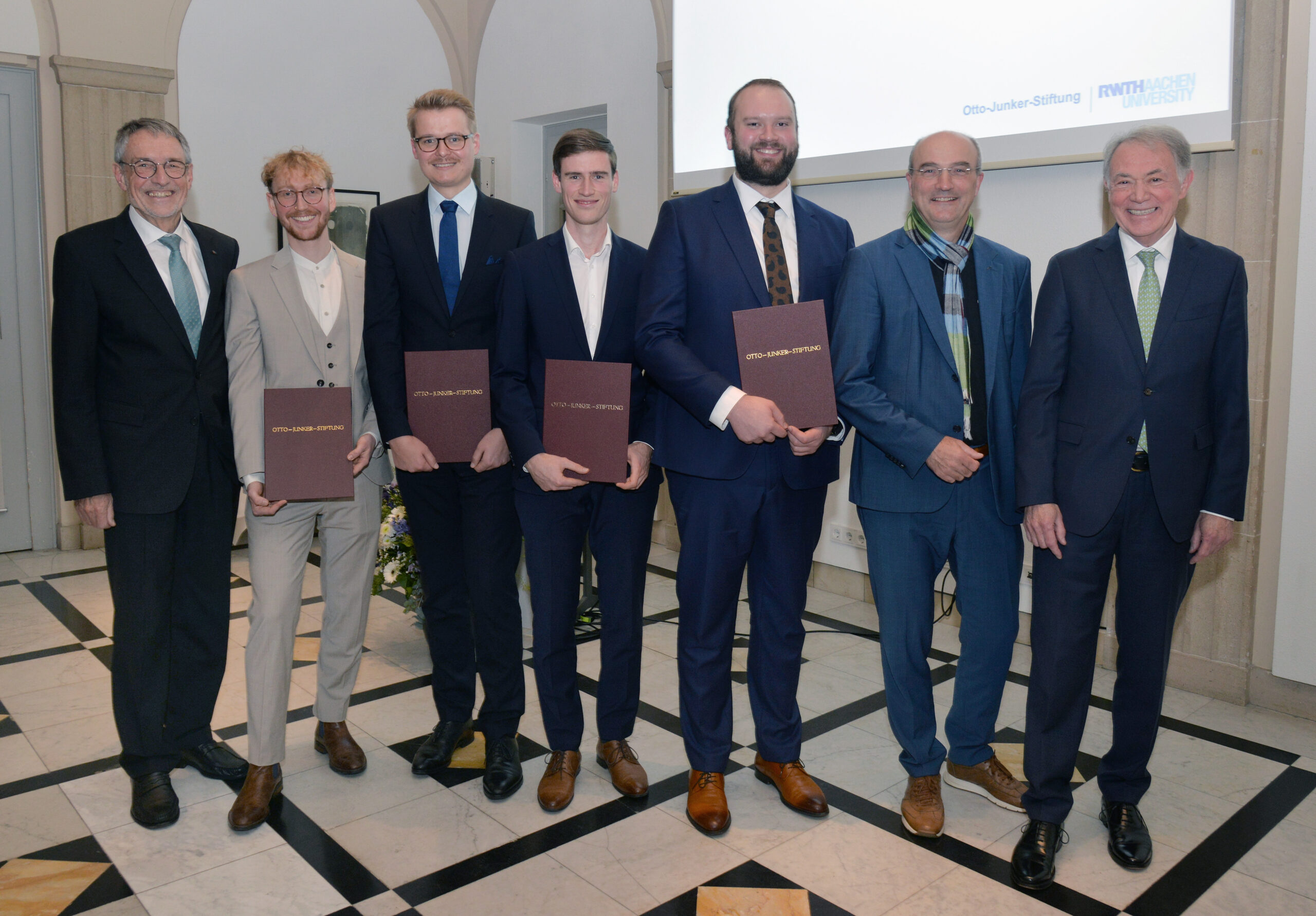
Wolfgang Bleck (on the left), Udo von Berg (on the right) and Ulrich Rüdiger (second from right) extended their congratulations to the award winners Jan Krusenbaum (second from left), Gerrit Ipers (third from left), Daniel Baggen (fourth from left) and Moritz Diewald (third from right). ©Andreas Schmitter
At this year’s Otto Junker Award ceremony, two outstanding young talents, Daniel Baggen and Gerrit Ipers, from the Faculty of Electrical Engineering and Information Technology, were honoured for their outstanding academic achievements.
Daniel Baggen, born in Aachen in 2000, commenced the Bachelor’s degree programme in Electrical Engineering, Information Technology and Computer Engineering at RWTH Aachen University following the completion of his Abitur at Städtisches Gymnasium Herzogenrath. He completed his Master’s degree with a thesis on “the design and commissioning of a highly integrated DC-DC converter for the production of green hydrogen” at the Institute for Power Electronics and Electrical Drives under the supervision of Professor Rik W. De Doncker. Since November 2023, Baggen has been working as a doctoral student in the field of power electronics.
Gerrit Ipers, aged 27, was born in Viersen. Subsequent to his graduation from the Liebfrauenschule Mülhausen in Grefrath, he first completed a Bachelor’s and thereafter a Master’s degree in industrial engineering, with a specialisation in electrical power engineering, at the RWTH Aachen University. He authored his master’s thesis, entitled “Rapid Prediction of Electro-Chemo-Mechanical Degradation of Li-Ion Batteries for End-of-Life Options”, at the Massachusetts Institute of Technology in the USA. Prior to this, he completed the T.I.M.E. double master’s programme at the KTH Royal Institute of Technology in Stockholm. He was supervised by Professor Dirk Uwe Sauer, also from the Institute for Power Electronics and Electrical Drives at RWTH Aachen University. Since May 2023, Ipers has been employed as a technical project manager at a Swedish automotive supplier.
Moritz Diewald, from the Department of Materials Science and Engineering in the Faculty of Georesources and Materials Engineering, impressed the jury with his Master’s thesis, in which he investigated sub-stoichiometric combustion as part of multi-stage flameless oxidation, using both numerical and experimental techniques. In the same department, Jan Krusenbaum was honoured for his Master’s thesis entitled “Thermal conditioning of Li-ion battery shredders as part of a novel recycling process: Effects of the process gas atmosphere and other determinants on the recovery of the critical element lithium”.
The awards were bestowed at a celebratory ceremony. Udo von Berg, Chairman of the Otto Junker Foundation, and Ulrich Rüdiger, Rector of RWTH Aachen University, presented the awards. Professor Wolfgang Bleck, who holds the title of Professor Emeritus and serves as Chairman of the Foundation’s Scientific Advisory Board, extended congratulations on the occasion.
The awards, which are named in honour of the foundation’s founder, Dr. Otto Junker, are bestowed annually upon the most distinguished graduates of the Faculty of Electrical Engineering and Information Technology and the Materials Science and Engineering Group, which is part of the Faculty of Georesources and Materials Engineering. The foundation, which was established in 1970, is dedicated to the advancement of young scientists and provides substantial support for a multitude of individual research projects.
The exceptional accomplishments of these four graduates not only exemplify their individual excellence but also reflect positively on RWTH Aachen University as an institution of higher educations that nurtures outstanding individuals. We would like to extend our sincerest congratulations to Daniel Baggen, Gerrit Ipers, Moritz Diewald and Jan Krusenbaum on this well-deserved recognition. We wish them continued success in their promising careers.
Team AixSense successful in the SensUs competition 2024
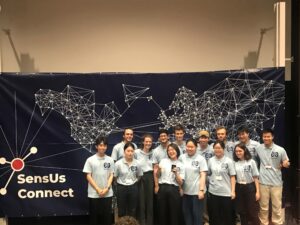
This years AixSense team at the SensUs competition 2024 ©RWTH
The RWTH team impresses with its biosensor for monitoring kidney failure
For the seventh time already, the 15 students of the AixSense team successfully took part in the SensUs competition, organised by Eindhoven University of Technology. This year, 18 teams competed against each other in the international competition with their point-of-care (PoC) biosensor solutions for the real-time detection of creatinine for monitoring acute kidney failure. The AixSense team also included 3 students from the Japanese partner university Tokyo Institute of Technology.
This year, AixSense won three out of five categories with its PoC and also took second place in the technological innovation and technical feasibility categories. Particularly noteworthy is the performance in the area of public relations and scientific communication: the team from Aachen received the Vlog Award for their video diary and AixSense also won the public voting for the Public Inspirations Award.
The Institute for Materials in Electrical Engineering 1 at RWTH Aachen University has been involved in the competition since 2018. Every year, Professor Sven Ingebrandt and Dr. Vivek Pachauri put together a team from various degree programmes. The team is supported by various structures and profile areas at RWTH, such as the Lab center for micro and nanotechnology (ZMNT), which advises the team on technical issues.
The annual competition encourages international and interdisciplinary collaboration in fields such as electrical engineering and micro-nanotechnology, transformative materials, biology, engineering and medical sciences, among others.
Interested parties can apply for the SensUs 2025 competition at pachauri@iwe1.rwth-aachen.de until November 2024.
Visit from Professor Mohamend-Ali Belabbas
Pr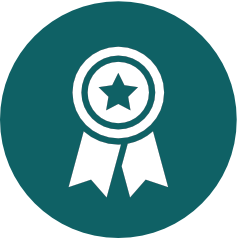 ofessor Mohamed-Ali Belabbas, this year’s winner of the ‘Friedrich Wilhelm Bessel Research Award’ from the Alexander von Humboldt Foundation, is visiting the Chair of Intelligent Control Systems during August.
ofessor Mohamed-Ali Belabbas, this year’s winner of the ‘Friedrich Wilhelm Bessel Research Award’ from the Alexander von Humboldt Foundation, is visiting the Chair of Intelligent Control Systems during August.
The Chair of Intelligent Control Systems will be the host during the funding period.
We congratulate the award winner and wish him a pleasant stay.
Further information on the sponsorship can be found on the website of the Alexander von Humbold Foundation.
Michael Vorländer is new president of the ASA
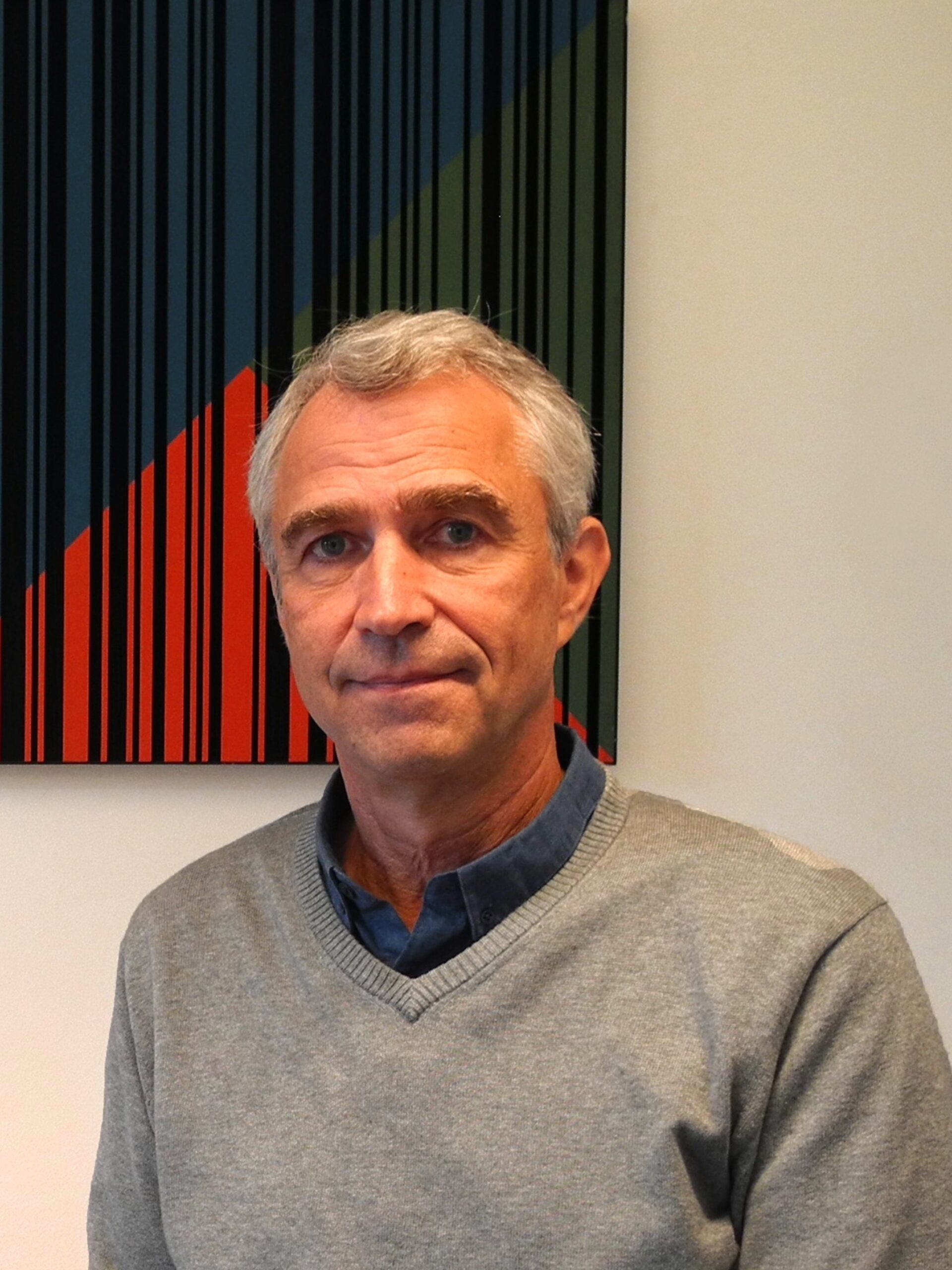
© IHTA
The first non-American president of the Acoustical Society of America (ASA) is Professor Michael Vorländer, Chair of Technical Acoustics at RWTH Aachen University.
Founded in 1929, the ASA is the world’s largest professional society in the field of acoustics. Professor Vorländer will serve as a member of the ASA Board of Directors from May 2024 to May 2027 and as President in 2025/2026.
“It is a great honour to be elected President of the ASA. Being the first non-American President is an important step for international cooperation in acoustics and underlines the increasing importance of international perspectives in the scientific community”,
says Vorländer.
With approximately 7,000 members, the ASA is dedicated to the advancement and dissemination of knowledge in the field of acoustics. The society covers a broad spectrum of acoustical disciplines, supports research, education and application of acoustical principles, develops standards and guidelines, organises conferences and publishes scientific journals such as the renowned “Journal of the Acoustical Society of America”.
For more information about the Acoustical Society of America, please visit their website.
Tim Brimmers: Winner of the SEW-EURODRIVE Foundation Study Award 2023
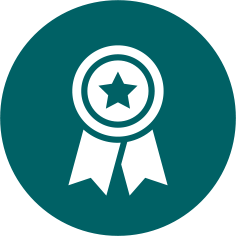
Congratulations to Tim Brimmers, who will be awarded the 2023 Study Prize worth 2,500 euros at the Ernst Blicke Award Ceremony on 17 May 2024.
The Executive Board of the SEW-EURODRIVE Foundation selected Mr Brimmers as the winner in order to fulfil the Foundation’s purpose of honouring and making visible outstanding academic achievements of young people.
We, the Faculty of Electrical Engineering and Information Technology, are very proud to have such outstanding candidates as Tim Brimmers in our ranks.
Excellent results at the Workshop Biosignals 2024
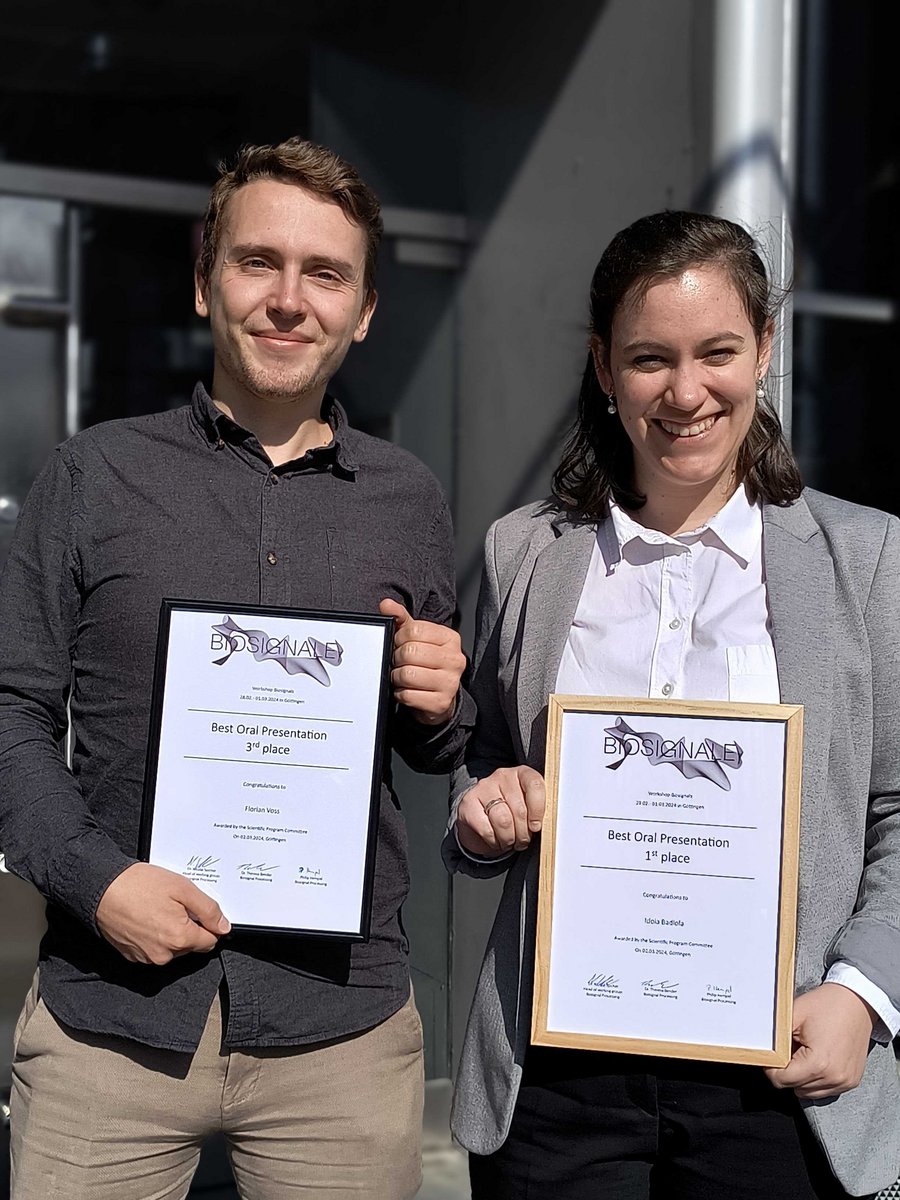
© Medical Information Technology (MedIT)
Idoia Badiola and Florian Voss from the Chair of Medical Information Technology (MedIT) at the Helmholtz Institute for Biomedical Engineering at RWTH Aachen University successfully participated at the Workshop Biosignals 2024, which took place from 28th February to 1st March in Göttingen.
The technical committees “Biosignals” and “Magnetic Methods in Medicine” of the German Society for Biomedical Engineering cordially invited all interested scientists, especially from the field of early career researchers, to the Workshop Biosignals.
Accepting the challenge Idoia was awarded the 1st place in the category “Best Oral Presentation” for her presentation “Mapping of peripheral venous hemodynamics using a low-cost camera: a proof-of-concept”. Florian achieved the 3rd place with his presentation “Camera Fusion for Improving Body Part Segmentation of Preterm Infants”.
“Congratulations to our colleagues Idoia Badiola and Florian Voss on their outstanding achievements”,
commented MedIT.
With this event, the committees are continuing a more than 20-year tradition of successful collaboration. Important components of the workshop were keynote speeches by young scientists as well as detailed poster presentations with short talks in which each submitted paper could be discussed constructively and critically. Submissions on biosignal analysis, biomagnetism and new related topics such as artificial intelligence and medical data science were welcome.
The event was hosted by the Biosignal Processing Group of the University Medical Centre Göttingen and supported by the Medical Image- and Signal Processing Working Group of the German Association for Medical Informatics, Biometry and Epidemiology.
“Special thanks go to the organisation team of the workshop, particularly Dr. Nicolai Spicher, Theresa Bender and Philip Hempel”,
added the Chair of Medical Information Technology.
Further information on the Workshop Biosignals can be found on the event’s homepage.
Find out more about the Chair of Medical Information Technology (MedIT) here.
BMBF supports “SPEED” project by Dr Weihan Li
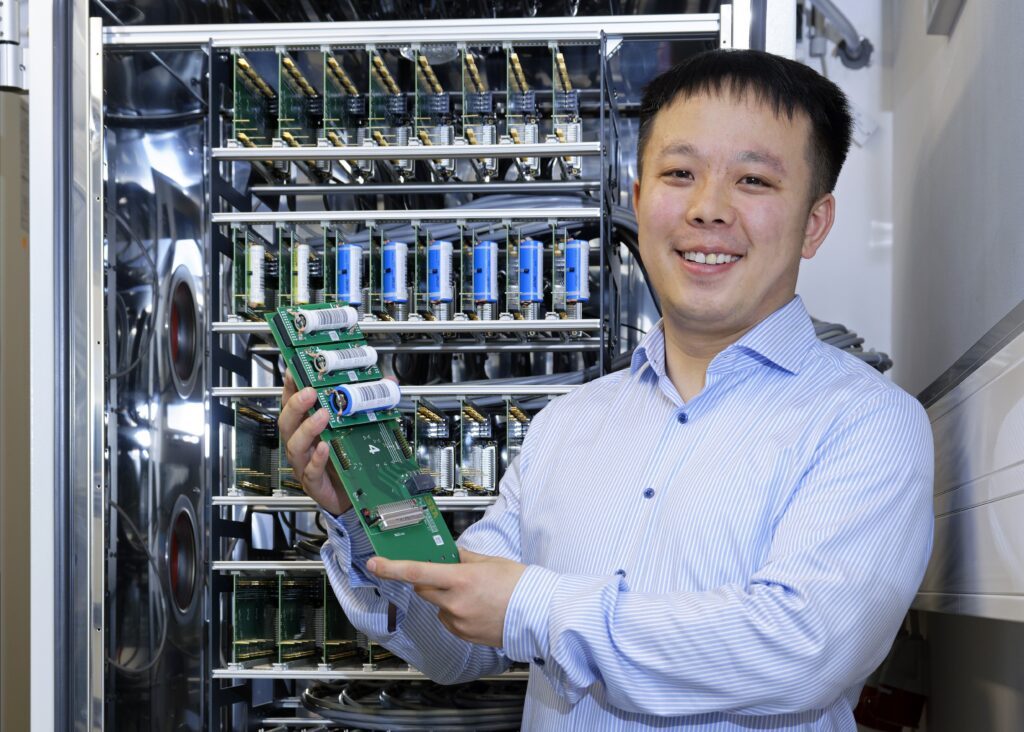
Dr. Weihan Li © Peter Winandy
The German Federal Ministry of Education and Research (BMBF) is funding Dr Weihan Li’s project “SPEED” – Rapid characterisation of the performance of lithium-ion batteries from the production line using machine learning” with 1.85 million euros over the next five years as part of its “BattFutur – Young Investigators Group Battery Research” competition.
At the Center for Ageing, Reliability and Lifetime Prediction of Electrochemical and Power Electronic Systems (CARL) at RWTH Aachen University, the junior research group ‘Artificial Intelligence for Batteries’ is pioneering the development of approaches to automate, digitalise, and accelerate the evaluation of battery performance from production lines using machine learning.
The ‘BattFutur’ funding initiative is part of the ‘Battery Research Factory’ concept, which is embedded in the ‘From Material to Innovation’ framework programme. This programme is a central pillar of the German government’s high-tech strategy. To attract excellent scientists in the field of battery technology to German science and industry, optimal starting conditions must be created. Therefore, promoting young scientists is essential.
Dr Weihan Li has led his junior research group since graduating with honours in Electrical Engineering and Information Technology from RWTH Aachen University in 2021. He completed his Master’s degree in Automotive Engineering and Transportation at RWTH in 2017, after earning his Bachelor’s degree in Automotive Engineering at Tongji University in 2014. Throughout his academic career, Dr Li has conducted research at esteemed institutions such as Imperial College London, the University of Oxford, and the Massachusetts Institute of Technology. He has received numerous awards, including the German Study Prize of the Körber Foundation, the Reichart Prize of the Akademie Gemeinnütziger Wissenschaften zu Erfurt, the vgbe Innovation Prize, the RWTH Innovation Prize, and the Battery Young Research Award.
Institute for Power Electronics and Electrical Drives (ISEA)
Student of the year 2024: Contimi Kenfack Mouafo
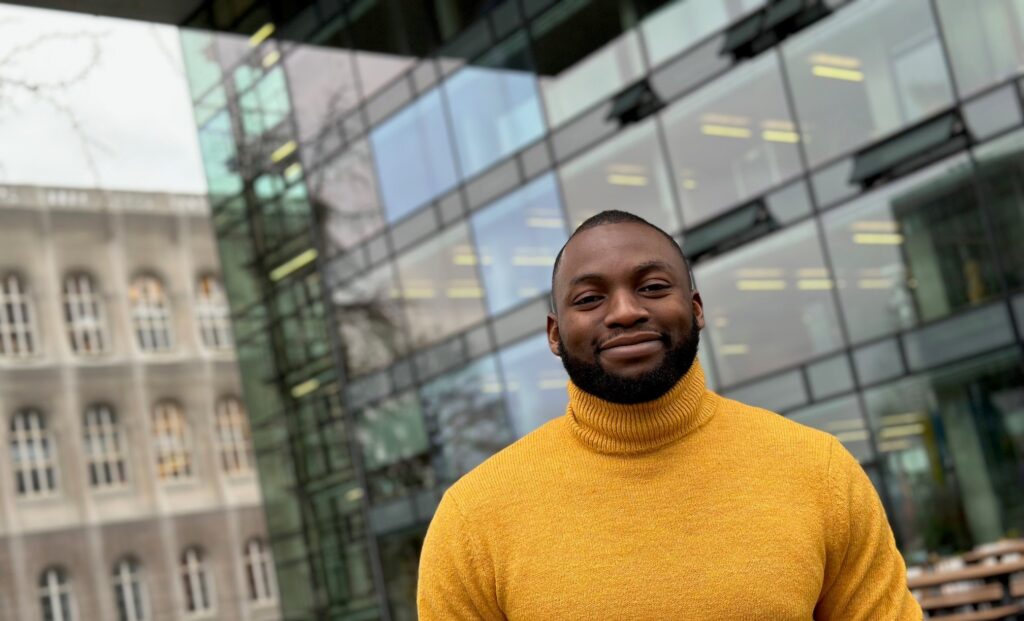
Contimi Kenfack Mouafo is Student of the Year 2024. © Thorsten Karbach
The German University Association has awarded the title of ‘Student of the Year 2024’ to an outstanding young man who is studying Electrical Engineering and Information Technology at RWTH and is involved with the ‘3 E’s 4 Africa’ association. Congratulations to him!
Contimi Kenfack Mouafo is a passionate advocate for the potential of young people in Africa. He campaigns against climate change with innovative projects and aims to correct the negative image of his home continent.
“We must show that African countries are different from the negative stereotypical images that are constantly conveyed.”, says Contimi Kenfack Mouafo.
The association ‘3 E’s 4 Africa’ promotes projects that focus on sustainable fertiliser production from green hydrogen in Namibia and more efficient biogas plants for small farmers in Ghana. The organisation’s name stands for Education, Empowerment and Ecofriendliness.
At the age of 19, the student came to Germany to study and became active in Engineers Without Borders. Later, he founded the ‘3 E’s 4 Africa’ association, where he has been the Chairman of the Board ever since. The association aims to support African students who are working on local education and research projects related to energy transition, combating climate change, and climate change adaptation. German students also contribute to this objective.
The organisation promotes research projects that are environmentally friendly and tackle local challenges while developing African solutions. They network those involved and support independent action by African partners. Additionally, the organisation contributes to the integration of international students at German universities.
Mr Kenfack Mouafo will be honoured as ‘Student of the Year 2024’ at the ‘Gala of German Science’ in Berlin on 25 March for his inspiring commitment. The German Student Union (DSW) and the German University Association (DHV) will present him with the award, which is endowed with 5,000 euros. The Faculty of Electrical Engineering and Information Technology congratulates Mr Kenfack Mouafo on his achievement and wishes him all the best for the future!
Information about the association “3 E’s 4 Africa e. V.” can be found here.


